Problem Description: I want to be able to pass around a list of methods to other classes where the methods have been defined in only one class. If the methods, some of which have input parameters and non-void return types, are defined in one class, I want to be able to pass a list of some of them, with possible duplicates, as a parameter to some other class's constructor.
Code Description: The code below is a crude example and can be ignored if it detracts from the main goal. Another example, in addition to the one below, would be a case where the methods are int Add(int n1, int n2), int Subtract(int n1, int n2), Multiply, etc.. and the interface has a method called int MathOperation(int n1, int n2).
Attempt to solve the problem: The adapter pattern seems to have the functionality I'm looking for but I have only seen examples where the methods in the interface have no input or output parameters. An example implementation I wrote just for this question is posted below.
Problem Analogy: You have a random picture generator web service. There are 30 mutations that can be applied to an image. The client connects and clicks a "generate" button and a random list of some of those functions are passed to some other class within the web service which then proceeds to run those functions with it's own data while also collecting and possibly re-using the return values to generate some mutated cat image. It can't just explicitly call the methods in the other class because that process needs to be done randomly at run-time. That is why I lean towards the idea of generating a random list of methods which are executed in-order when the 'generate' button is clicked.
I hope I have been clear.
public class SomeClass {
...
public double UseWrench(double torque, boolean clockwise) { ... }
public double UsePliers(double torque, boolean clockwise) { ... }
public double UseScrewDriver(double torque, boolean clockwise) { ... }
public boolean UseWireCutters(double torque) { ... }
interface IToolActions {
double TurnFastener(double torque, boolean clockwise);
boolean CutWire(double torque);
}
private IToolActions[] toolActions = new IToolActions[] {
new IToolActions() { public double TurnFastener(double torque, boolean clockwise) { double UseWrench(double torque, boolean clockwise); } },
new IToolActions() { public double TurnFastener(double torque, boolean clockwise) { double UsePliers(double torque, boolean clockwise); } },
new IToolActions() { public double TurnFastener(double torque, boolean clockwise) { double UseScrewDriver(double torque, boolean clockwise); } },
new IToolActions() { public boolean CutWire(double torque) { boolean UseWireCutters(double torque); } },
};
}
public class Worker<T> {
public List<? extends IToolActions> toolActions;
public Worker(List<? extends IToolActions> initialToolSet){
toolActions = initialToolActions;
}
}

